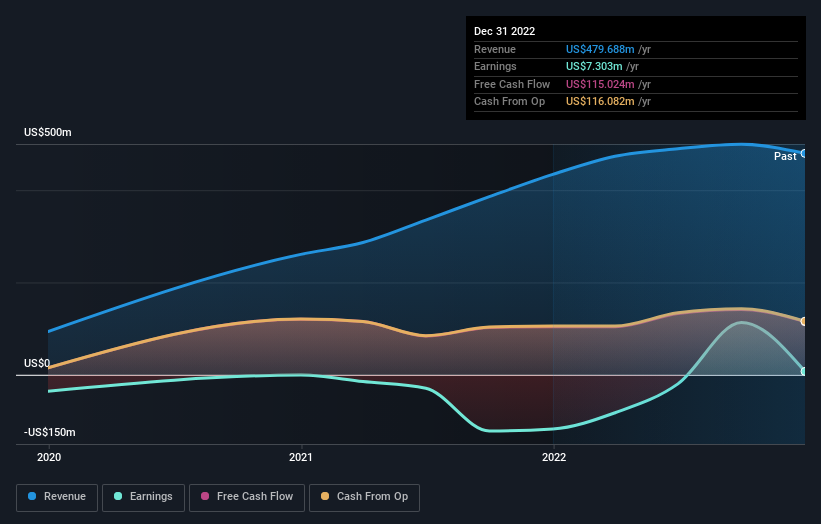Recent 8.5% pullback would hurt GDEV Inc. (NASDAQ:GDEV) insiders
Key Insights
GDEV's significant insider ownership suggests inherent interests in company's expansion
A total of 2 investors have a majority stake in the company with 58% ownership
Using data from company's past performance alongside ownership research, one can better assess the future performance of a company
Every investor in GDEV Inc. (NASDAQ:GDEV) should be aware of the most powerful shareholder groups. We can see that individual insiders own the lion's share in the company with 48% ownership. That is, the group stands to benefit the most if the stock rises (or lose the most if there is a downturn).
And last week, insiders endured the biggest losses as the stock fell by 8.5%.
In the chart below, we zoom in on the different ownership groups of GDEV.
View our latest analysis for GDEV
What Does The Lack Of Institutional Ownership Tell Us About GDEV?
Small companies that are not very actively traded often lack institutional investors, but it's less common to see large companies without them.
There are many reasons why a company might not have any institutions on the share registry. It may be hard for institutions to buy large amounts of shares, if liquidity (the amount of shares traded each day) is low. If the company has not needed to raise capital, institutions might lack the opportunity to build a position. On the other hand, it's always possible that professional investors are avoiding a company because they don't think it's the best place for their money. GDEV might not have the sort of past performance institutions are looking for, or perhaps they simply have not studied the business closely.
GDEV is not owned by hedge funds. Everix Investments Limited is currently the largest shareholder, with 38% of shares outstanding. The second and third largest shareholders are Boris Gertsovskiy and Andrey Fadeev, with an equal amount of shares to their name at 20%. Andrey Fadeev, who is the third-largest shareholder, also happens to hold the title of Member of the Board of Directors.
A more detailed study of the shareholder registry showed us that 2 of the top shareholders have a considerable amount of ownership in the company, via their 58% stake.
While it makes sense to study institutional ownership data for a company, it also makes sense to study analyst sentiments to know which way the wind is blowing. As far as we can tell there isn't analyst coverage of the company, so it is probably flying under the radar.
Insider Ownership Of GDEV
The definition of company insiders can be subjective and does vary between jurisdictions. Our data reflects individual insiders, capturing board members at the very least. Company management run the business, but the CEO will answer to the board, even if he or she is a member of it.
I generally consider insider ownership to be a good thing. However, on some occasions it makes it more difficult for other shareholders to hold the board accountable for decisions.
It seems insiders own a significant proportion of GDEV Inc.. It is very interesting to see that insiders have a meaningful US$532m stake in this US$1.1b business. It is good to see this level of investment. You can check here to see if those insiders have been buying recently.
General Public Ownership
With a 14% ownership, the general public, mostly comprising of individual investors, have some degree of sway over GDEV. While this group can't necessarily call the shots, it can certainly have a real influence on how the company is run.
Private Company Ownership
Our data indicates that Private Companies hold 38%, of the company's shares. Private companies may be related parties. Sometimes insiders have an interest in a public company through a holding in a private company, rather than in their own capacity as an individual. While it's hard to draw any broad stroke conclusions, it is worth noting as an area for further research.
Next Steps:
It's always worth thinking about the different groups who own shares in a company. But to understand GDEV better, we need to consider many other factors. For example, we've discovered 3 warning signs for GDEV (1 is a bit unpleasant!) that you should be aware of before investing here.
If you would prefer check out another company -- one with potentially superior financials -- then do not miss this free list of interesting companies, backed by strong financial data.
NB: Figures in this article are calculated using data from the last twelve months, which refer to the 12-month period ending on the last date of the month the financial statement is dated. This may not be consistent with full year annual report figures.
Have feedback on this article? Concerned about the content? Get in touch with us directly. Alternatively, email editorial-team (at) simplywallst.com.
This article by Simply Wall St is general in nature. We provide commentary based on historical data and analyst forecasts only using an unbiased methodology and our articles are not intended to be financial advice. It does not constitute a recommendation to buy or sell any stock, and does not take account of your objectives, or your financial situation. We aim to bring you long-term focused analysis driven by fundamental data. Note that our analysis may not factor in the latest price-sensitive company announcements or qualitative material. Simply Wall St has no position in any stocks mentioned.

 Yahoo Finance
Yahoo Finance 

